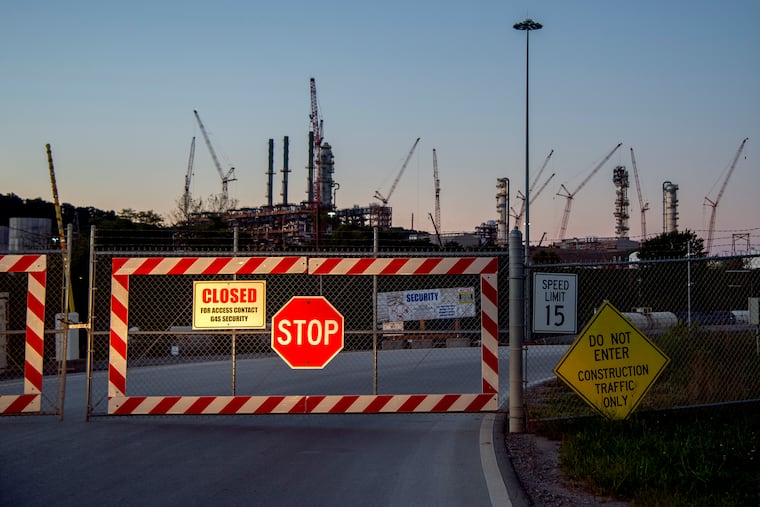Fracking puts Pa. at an energy crossroads. It’s time to pick a direction. | Editorial
Pennsylvania’s ties to the natural gas industry on one hand with climate goals on the other threaten future progress.

More than a decade ago, Pennsylvania found itself at the heart of a world-changing revolution.
The ability to extract natural gas from shale by combining two technologies — hydraulic fracturing and horizontal drilling — was to be a geopolitical game changer releasing America from dependence on oil-producing countries in the Middle East. Domestically, it was to be an economic game changer, bringing jobs back to the abandoned coal towns of Appalachia, and an environmental game changer, due to the low levels of CO2 in natural gas.
» READ MORE: California lawmakers propose ban on fracking by 2027
The western part of Pennsylvania sits on the Marcellus shale formation, one of the richest in the country. The shale revolution should have had a happy ending for the commonwealth in the form of more jobs, more revenue, fewer emissions, and a cleaner environment. Instead, in the recent words of the Delaware River Basin Commission, “fracking activities have resulted in impairment to water resources, the environment, human health, and ecosystem health.”
Now Pennsylvania is at a crossroads.
On one hand, the natural gas industry and infrastructure are entrenched in Pennsylvania. On the other, a glut of supply and low prices have pushed lawmakers to create demand for gas to justify fracking, in the form of subsidies for petrochemical plants that use natural gas to make materials like plastics. Meanwhile, Gov. Tom Wolf has set lofty climate goals, such as cutting greenhouse gas emissions by 26% by 2030 and 80% by 2050. Wolf also directed his agencies to work on joining the Regional Greenhouse Gas Initiative, a multistate initiative to cap emissions.
In his latest budget address, the governor once again proposed a severance tax on natural gas extraction — something he has unsuccessfully proposed every budget cycle.
Pennsylvania’s ties to the natural gas industry on one hand with climate goals on the other not only threaten future progress, but also provide openings to roll back the little progress already achieved.
» READ MORE: Fracking ban for Delaware River basin heads to a showdown in federal court
For example, in January, Republican legislators filed a lawsuit against the Delaware River Basin Commission, the interstate agency that manages water use in the Delaware watershed, arguing that the agency doesn’t have jurisdiction to ban fracking in the basin — all in the name of a small group of landowners hoping to become “Shale-ionnaires.” The ban has been in place since 2010.
The fight over fracking is heating up. But with more time and data, the arguments from fracking’s proponents lose standing.
A new report from the Ohio Valley River Institute, an independent think tank, shows that the eight counties that produce the bulk of natural gas in Pennsylvania gained fewer jobs than the statewide average. These counties also lost population.
John Hanger, who served as Pennsylvania secretary of Environmental Protection under Gov. Ed Rendell, commented on the findings, saying: “This report explodes in a fireball of numbers the claims that the gas industry would bring prosperity to Pennsylvania, Ohio or West Virginia. These are stubborn facts that indicate gas drilling has done the opposite.”
The damaging impacts of fracking go far beyond jobs: Industry impact fees are decreasing significantly every year, causing budget problems for counties. Emissions of methane (which natural gas has in abundance) are undercutting progress in CO2 reductions, and the health hazards of fracking are documented over and over again — from an investigative grand jury report to a Pulitzer Prize-winning book.
As rock miles underground is fractured, so too are lives above ground, as communities have been pitted against each other by promises of riches that, sadly, have not materialized except for a lucky few. Communities all over the commonwealth got stuck in years of litigation and contentious processes if they dared challenge the industry.
» READ MORE: Lt. Gov. John Fetterman should stand with East Pittsburgh against fracking | Opinion
Pennsylvania is the home of the first oil well drilled in U.S. history. The commonwealth has a long relationship with extractive industry, but it is an abusive one. It is time to start planning a divorce. The encouragement of industry, in the form of petrochemical subsidies and still-lax regulations, undercuts important investments in renewable energy and the potential benefits of programs like the Regional Greenhouse Gas Initiative.
What exactly a divorce looks like and how fast it could happen is not obvious. But it’s time for Pennsylvania to choose a side: empty promises of benefits in the face of losses, or a path to transform fractured communities to become sustainable and resilient.